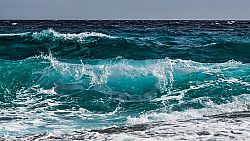

New research by a team of Australian scientists has found that rapidly melting Antarctic ice is slowing down deep ocean currents. The results could have significant impacts on the climate.
Deep ocean currents are important natural cycles that carry vital heat, oxygen, carbon and nutrients around the world. They are partly driven by the downward movement of cold and dense saltwater near Antarctica. This movement brings up nutrients from the bottom of the ocean and distributes them around the world, essentially resupplying nutrients for the global ecosystem. The currents also act as an insulator, and should the currents slow or stop then it could cool the ocean and subsequently north-west Europe.
However, an influx of fresh water from melting ice means the sea water is becoming less salty and dense, slowing the downward movement that is required for the currents to work. Although they have been relatively stable for thousands of years, the research now suggests that the warming climate is disrupting them to the point where they could slow by more than 40% by 2050 and, according to study lead Professor Matthew England, "on a trajectory that looks headed towards collapse." Professor End stated "In the past, these circulations have taken more than 1,000 years or so to change, but this is happening over just a few decades. It's way faster than we thought these circulations could slow down."
As well as impacting on nutrient flow, the slowdown could reduce the ocean's ability to absorb carbon dioxide. As the circulation slows down, water on the surface will reach its carbon-absorbing capacity quicker but it is not then replaced be non carbon-saturated water from deeper parts of the ocean.
In addition, the Atlantic Meridional Overturning Circulation acts like a conveyor belt and helps to insulate parts of Europe. Should it slow down or collapse, north-west Europe could become colder.
This research was published at a similar time to other climate-related reports, particularly from the Intergovernmental Panel on Climate Change (IPCC), which have stated that we're rapidly running out of time to slow down climate change and to prevent catastrophic environmental changes as a result. Professor England said that the IPCC models used don't factor in the effect of Antarctic meltwater on ocean currents yet, but believes the impact will be "considerable".